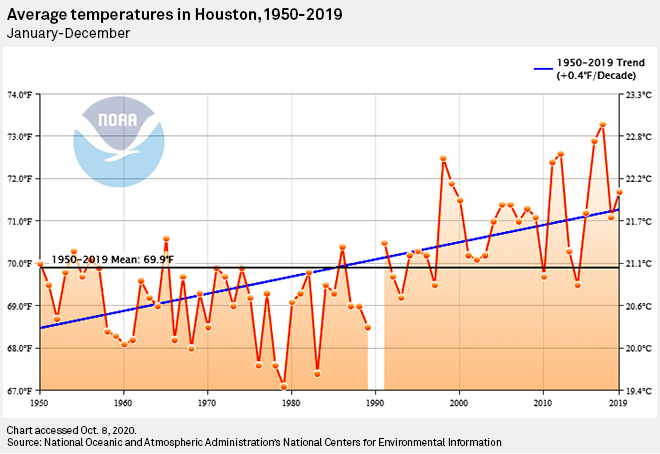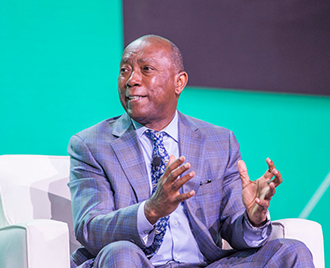
Houston residents flee their homes in the wake of Hurricane Harvey in August 2017. The deadly hurricane was a "game-changer" in awakening the city to the realities of climate change, said Mayor Sylvester Turner. |
Not long ago, if you found yourself at a party in Houston, a sure way to quiet the room was to announce that you were in the clean energy business, according to Bob Harvey, president and CEO of the Greater Houston Partnership, the city's top business trade group.
"But that's not the case today," he said.
Perhaps more than any major city in America, Houston faces fundamental questions about its economy and its future in the global energy transition. Some 4,600 energy companies, including more than a dozen Fortune 500 companies, serve as the foundation of the city's economy.
Those companies include 44 of the 128 publicly traded oil and gas firms, according to the Greater Houston Partnership, including the headquarters of ConocoPhillips, Phillips 66 and Occidental Petroleum Corp., which have a combined market capitalization of $71.4 billion. Meanwhile, climate change has already contributed to extreme weather that has caused billions of dollars worth of property damage in Houston and killed dozens of residents.
Houstonians today are still reeling from six federally declared flooding disasters during the past five years, including Hurricane Harvey, which slammed the city with up to 130-mile winds in August 2017, dropped more rainfall than any recorded tropical cyclone in U.S. history and contributed to up to 75 deaths.

Harvey "was a game-changer," Mayor Sylvester Turner said Sept. 14 at the city's first climate week conference, held virtually. "And it pretty much set us up for ... the city's first-ever climate action plan."
A Democrat serving in his second term, Turner has made the energy transition a central part of his tenure, declaring publicly that Houston is ready to marshal its large pool of fossil fuel workers to help lead the clean energy industry.
"Our view is, 'Hey, now we have to take that skill set and apply it to renewable energy and energy storage and clean technology with the same degree of spirit that we used in shale," Harvey, of the Greater Houston Partnership, said in an interview, referring to the shale gas revolution that has driven the most recent oil and gas boom but has sputtered as oil prices have cratered, dragging Houston's economy down with it.
While the city's climate vision pushes for more electric vehicles, renewable power and clean energy jobs, it also relies upon the development of technology that can save fossil fuels from irrelevance, such as carbon capture and storage, as well as low-carbon fuels.
Houston learned from the oil bust of the 1980s and has diversified its economy. But the most recent collapse, along with the COVID-19 pandemic, has reminded the city that it still rides a roller coaster of volatile commodities — and that a more stable future may lie in cleaner forms of energy.
According to Environmental Entrepreneurs, or E2, Houston, which has roughly 2.3 million residents, ranked seventh among the top 50 U.S. metro areas for clean energy employment in the fourth quarter of 2019, with 1.9% of all clean energy jobs in the U.S. In 2019, Houston had 56,155 clean energy jobs, up nearly 4% from 2018, according to E2. By comparison, there are roughly 250,000 fossil fuel jobs in the area.

There are at least 100 solar energy-related companies and 30 wind energy-related companies — including developers, transporters, manufacturers, suppliers and others — located in Houston, according to the Greater Houston Partnership. They include big names such as BP Wind Energy North America Inc., Shell Global Solutions (US) Inc., GE Renewable Energy, Sunnova Energy International Inc. and First Solar Inc.
Backed with funding from Houston-based EnCap Investments LP, a venture capital firm that typically specializes in oil and gas investments, Broad Reach Power LLC is quickly becoming a big player in the booming battery storage market in Texas.
Steve Vavrik, managing partner and CEO of Broad Reach Power, said it was an easy decision to locate in Houston when the company formed in 2019 because of the city's skilled workforce. The company has nearly 30 employees and is planning to expand, he said.
"The knowledge of how energy gets from resource to customers is really concentrated there," said Vavrik, who himself used to work on fossil fuel plant development earlier in his career.
Balancing act
Still, Turner faces a balancing act in his crusade for net zero emissions by midcentury. Oil and gas companies helped write, and finance, Houston's climate plan — which seeks to reduce consumption of the products they sell.
BP America Inc. awarded a $2 million grant to the city's Office of Sustainability to help fund the study and will serve as the city's "strategic planning and technical partner" on the climate plan for the next four years, according to a July news release. Hurricane Harvey's torrential rains flooded BP's Houston campus.
"It's no coincidence the logo of an oil and natural gas company is found on the cover page of the City's Resilience Assessment," the Texas Oil and Gas Association said in a 2019 letter to the city about its draft climate plan. (The assessment is different from the climate plan).
Houston Mayor Sylvester Turner is trying to reduce the carbon footprint of a city whose economy is built on hydrocarbon products. |
The trade group, which represents oil and gas companies statewide, requested that the word "decarbonization" be struck from the city's climate plan, and that "energy transition" be used instead. "Decarbonization" never appeared in the final draft.
Todd Staples, president of the Texas Oil and Gas Association, said in a statement to S&P Global Market Intelligence that "Oil and natural gas is projected to be an essential part of a cleaner energy future and smart policies must be in place to ensure Texans do not suffer the brownouts and sky-high electricity prices that misguided mandates have caused in California."
Recent brownouts in California, which has a mandate for 100% clean energy by 2045, were caused by hotter than normal conditions, an early evening capacity shortage, the erroneous reduction of output from two gas plants and an overall lack of planning, according to grid officials.
Gavin Dillingham, program director for clean energy policy at the Houston Advanced Research Center at Rice University, who helped draft the climate plan, said officials looked for "market-based solutions."
"We really had to be careful as far as bringing too many regulatory or mandated kinds of actions," he said. "There was just already kind of a lot of potential pushback, especially since we are the oil and gas capital of the world."
While Houston's climate plan encourages more energy efficiency in buildings, it does not explicitly call for electrifying them, and the gas ban movement has not affected the city.
Phillips 66, one of Houston's largest companies with roughly 2,000 employees in the city, in its 2020 sustainability report called climate change a "global issue that requires long-term commitment, action by every segment of society, technology development and free-market solutions."
But the company forecast that renewable energy will make up only 28% of global energy consumption by 2050.
"Fossil fuels will continue to make up a significant portion of the global energy future," the report said. "We believe our business is sound and resilient to future policy or physical impacts and technology disruptors."
Houston itself ranks 32nd globally and ninth in the U.S. in terms of its carbon footprint, according to an international research survey compiled by the Norwegian University of Science and Technology that tracked the emissions of 13,000 cities. The city's climate plan proposes to reduce its 2014 carbon output by 40% by 2030, and 75% by 2040, before reaching net zero by midcentury.
Jammed freeways are a common feature of Houston life, and transportation, at nearly 50%, is one of the biggest contributors to the city's greenhouse gas emissions. The city's goal is for electric vehicles to make up 30% of sales by 2030, and to install a new network of charging stations and provide more alternative transportation.
Municipal facilities are already powered by 100% solar energy, thanks to a partnership with NRG Energy Inc.
Mauricio Gutierrez, president, CEO and director of NRG, which has set its own goal of net-zero carbon emissions by midcentury, said during a virtual climate week talk with the mayor that when he is asked about the direction of the power sector, he tells people to "look at Houston, look at ERCOT. That is the future of electricity." The grid operated by the Electric Reliability Council Of Texas Inc. leads the nation in wind power generation, and is also seeing a surge in solar projects that could transform the electricity market.
New generation
In September 2019, hundreds of students gathered in front of city hall to protest inaction on climate change. The protest occurred in the wake of Tropical Depression Imelda, which flooded thousands of homes, caused billions in damages and led to at least five deaths.
The fossil fuel industry is losing its traditional appeal as a career path, said Dillingham. "The number of people we have coming in from oil and gas is crazy," he said of recruiting clean energy researchers. "They're looking for something that is a little more sustainable, a little more climate friendly, that they can feel good about."
"If you're just starting out on your career, do you want to work in oil and gas? Probably not," said Emily Reichert, CEO of Greentown Labs, Inc., a cleantech incubator that recently opened a Houston office. "Do you want to work for renewable energy? Yes indeed."
While it may have made more sense to locate elsewhere, to a city like San Francisco, Reichert said, "honestly when we look across the country and we look at where we can have the greatest impact, that's where Houston comes to mind."
"Houston probably has 10 to 20 years max where their economy can rely on oil and gas," Reichert said. "That's it. The business leadership and mayor get that."
Bobby Tudor, the chair of the Greater Houston Partnership, addressed the energy transition during the group's annual meeting Jan. 22.
"Demonization of the energy business is hypocritical and just plain wrong. It is not helpful to finding a path to a cleaner future," Tudor said. But investor confidence in the conventional energy sector is at an all-time low, Tudor noted.
Whether or not one agrees with the scientific consensus on climate change, Tudor said, "it's hard to argue that we are not facing a dominant secular trend that has great momentum in the investment world and with the general public, and we must respond in a responsible and rational way."




